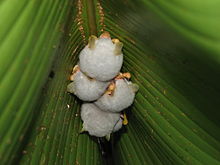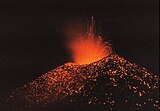Portal:Central America
The Central America Portal

Central America is a subregion of North America. Its political boundaries are defined as bordering Mexico to the north, Colombia to the southeast, the Caribbean to the east, and the Pacific Ocean to the southwest. Central America is usually defined as consisting of seven countries: Belize, Costa Rica, El Salvador, Guatemala, Honduras, Nicaragua, and Panama. Within Central America is the Mesoamerican biodiversity hotspot, which extends from southern Mexico to southeastern Panama. Due to the presence of several active geologic faults and the Central America Volcanic Arc, there is a high amount of seismic activity in the region, such as volcanic eruptions and earthquakes, which has resulted in death, injury, and property damage.
In the pre-Columbian era, Central America was inhabited by the Indigenous peoples of Mesoamerica to the north and west and the Isthmo-Colombian peoples to the south and east. Following the Spanish expedition of Christopher Columbus' voyages to the Americas, Spain began to colonize the Americas. From 1609 to 1821, the majority of Central American territories (except for what would become Belize and Panama, and including the modern Mexican state of Chiapas) were governed by the viceroyalty of New Spain from Mexico City as the Captaincy General of Guatemala. On 24 August 1821, Spanish Viceroy Juan de O'Donojú signed the Treaty of Córdoba, which established New Spain's independence from Spain. On 15 September 1821, the Act of Independence of Central America was enacted to announce Central America's separation from the Spanish Empire and provide for the establishment of a new Central American state. Some of New Spain's provinces in the Central American region (i.e. what would become Guatemala, Honduras, El Salvador, Nicaragua and Costa Rica) were annexed to the First Mexican Empire; however in 1823 they seceded from Mexico to form the Federal Republic of Central America until 1838. (Full article...)
Selected article
The Honduran white bat (Ectophylla alba), also called the Caribbean white tent-making bat, is a species of bat in the family Phyllostomatidae. It is the only member of the genus Ectophylla. The genus and the species were both scientifically described for the first time in 1892. It has distinctive, entirely white fur, which is only found in six of the roughly 1,300 known species of bat. It constructs "tents" out of understory plant leaves by strategically cutting the leaf ribs with its teeth; it roosts in these tents during the day. It is a specialist frugivore, consuming almost exclusively the fruits of one species of fig. Females can likely become pregnant twice per year, giving birth to one offspring at a time.
It is found in Honduras, Nicaragua, Costa Rica and western Panama at elevations from sea level to 700 m (2,300 ft). Due to habitat loss, it is evaluated as near-threatened by the IUCN. Its bright yellow ears, nose-leaf, and lips are a result of carotenoid deposition; the mechanism of this deposition is being researched as a way to understand and combat macular degeneration in humans. (Full article...)
Did you know...
- ... that El Salvador was the first country to recognize Manchukuo, apart from Japan?
- ... that Panama cross-banded tree frog males synchronize their mating calls to confuse predators that locate them by sound?
- ... that Panamanian earth scientist Erika Podest uses remote sensing to see how climate change has affected global soil moisture?
- ... that the 7th Macho de Monte Infantry Company of the Panama Defense Forces was named after a tapir?
- ... that the Central American government voted for annexation to the First Mexican Empire after a request from Regent Agustín de Iturbide?
- ... that Alfredo Frohlich formed an award-winning collection of Panamanian postal history that included items from as early as 1777?
- ... that the government of El Salvador, the Catholic Church, and street gangs negotiated a truce to reduce homicides from 2012 to 2014?
- ... that footballer Alexandra Pinell scored the Costa Rica U20 team's only goal at the FIFA tournament hosted by their country?
Related portals
Get involved
For editor resources and to collaborate with other editors on improving Wikipedia's Central America-related articles, see WikiProject Central America.
Need help?
Do you have a question about Central America that you can't find the answer to?
Consider asking it at the Wikipedia reference desk.
General images
In the news
- 28 October 2024 – Mexican Drug War
- In the last four days, at least 34 people have been killed in Tecpan de Galeana, Guerrero, Mexico, in cartel ambushes and clashes. Mexican police arrest 21 people, including sixteen Guatemalan and Salvadoran nationals. (Revista Proceso) (El Debate)
- 11 October 2024 – Foreign relations of Nicaragua, Foreign relations of Israel
- Nicaragua formally breaks off diplomatic relations with Israel, calling the Israeli government "fascist" and "genocidal". (Reuters)
- 4 October 2024 – Parole for Cubans, Haitians, Nicaraguans, and Venezuelans
- The United States Department of Homeland Security reports that the Biden administration will not renew the legal status of 530,000 migrants who entered the U.S. as part of a provisional humanitarian program beginning in 2022. (Reuters)
Subcategories
Topics
Associated Wikimedia
The following Wikimedia Foundation sister projects provide more on this subject:
-
Commons
Free media repository -
Wikibooks
Free textbooks and manuals -
Wikidata
Free knowledge base -
Wikinews
Free-content news -
Wikiquote
Collection of quotations -
Wikisource
Free-content library -
Wikiversity
Free learning tools -
Wiktionary
Dictionary and thesaurus























![Image 23Mesoamerica and Central America in the 16th century before Spanish arrival [according to whom?] (from Mesoamerica)](http://upload.wikimedia.org/wikipedia/commons/thumb/0/06/Mesoam%C3%A9rica_y_Centroamerica_prehispanica_siglo_XVI.svg/120px-Mesoam%C3%A9rica_y_Centroamerica_prehispanica_siglo_XVI.svg.png)













































